Click here for the
MNCH Newsletter Archives
Please send interesting articles via email, Facebook or Twitter
Meseret Desta Haileyesus, Editor
Email - Mesi
Twitter - @mesidesta
|
|
|
|
Welcome to the 43rd edition of our mother and child health newsletter
|
Our regular newsletters are an easy way to keep up-to-date with all new developments and interesting scientific research in the field. We keep you informed of all our upcoming events and activities so you never miss out.
If you have any comments about this or any other issues, please feel free to contact us at etmnch@ualberta.ca or to contact our Editor Meseret Desta Haileyesus at mesidesta@gmail.com.
|
|
Project receives Certificate of Appreciation from North Shoa Health Office
|
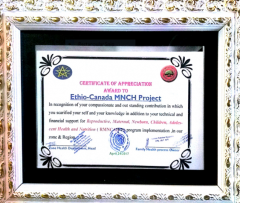 The Ethiopia-Canada MNCH project was awarded a Certificate of Appreciation from the North Shoa Health Office for its work to improve the quality of MNCH services in Oromia region, including: hiring an obstetrician and data quality officer to support Fiche zonal hospital; providing training to more than 500 health care providers in Basic Emergency Obstetric Newborn Care, Helping Babies Breathe, Helping Mother Survive Bleeding After Birth, Quality Improvement, Health Management Information Systems, and Respectful Maternity Care; quality improvement interventions that reduced the rate of hypothermia by 50%; providing basic medical supplies and registration books to improve care in the NICU of Fiche zonal hospital; and providing training to three midwives from health centres and colleges in North Shoa through the Senior Midwives Tutor Training Program. The Ethiopia-Canada MNCH project was awarded a Certificate of Appreciation from the North Shoa Health Office for its work to improve the quality of MNCH services in Oromia region, including: hiring an obstetrician and data quality officer to support Fiche zonal hospital; providing training to more than 500 health care providers in Basic Emergency Obstetric Newborn Care, Helping Babies Breathe, Helping Mother Survive Bleeding After Birth, Quality Improvement, Health Management Information Systems, and Respectful Maternity Care; quality improvement interventions that reduced the rate of hypothermia by 50%; providing basic medical supplies and registration books to improve care in the NICU of Fiche zonal hospital; and providing training to three midwives from health centres and colleges in North Shoa through the Senior Midwives Tutor Training Program.
The certificate was awarded during the 7th African Vaccination Week taking place April 24th to 30th in North Shoa, by the North Shoa Health Office Director Dr. Delesa Wolde. Representatives from the Ethiopian Federal Ministry of Health, North Shoa Health Office, WHO, UNICEF, CCRDA, GAVI and PATH participated in the week-long event.
|
|
Maternal stress during pregnancy could influence the biological clock for aging
|
 The stress that some mothers experience during their pregnancies could influence the genetic makeup their babies are born with and, eventually, lead to premature biological aging and associated age-related diseases, according to new research that focuses on a person’s DNA sequences called telomeres, which are essential for cellular replication. Because telomeres shorten substantially as people grow older, researchers use telomere length (TL) as a biological indicator or biomarker of aging. TL at birth is therefore an indicator of biological aging and associated age-related diseases. The stress that some mothers experience during their pregnancies could influence the genetic makeup their babies are born with and, eventually, lead to premature biological aging and associated age-related diseases, according to new research that focuses on a person’s DNA sequences called telomeres, which are essential for cellular replication. Because telomeres shorten substantially as people grow older, researchers use telomere length (TL) as a biological indicator or biomarker of aging. TL at birth is therefore an indicator of biological aging and associated age-related diseases.
A study by the University of Heidelberg in Germany measured TL in 319 newborns and 318 mothers. It also included interviews and questionnaires involving the mothers on their lifestyle habits, the amount of stress they believe they had to cope with, whether they suffered from any psychological disorders and also on aspects of the father. Saliva samples were collected from the mothers and umbilical cord blood immediately after the babies’ delivery to do genetic analyses.
The study found that the children of mothers who had experienced increased psychosocial stress during pregnancy were found to have shorter telomeres. However, the TL in babies of mothers who had been suffering from psychological disorders over the course of their lifetime was not found to be affected.
Read more here.
|
|
For many women, body image and sex life may suffer after episiotomy
|
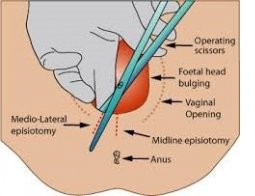 Women who have episiotomies after childbirth reported having poorer body image and less satisfying sex lives than women who tear and heal naturally. Women who have episiotomies after childbirth reported having poorer body image and less satisfying sex lives than women who tear and heal naturally.
An episiotomy is a surgical cut in muscles, tissue and skin between the vagina and anus to enlarge the opening for the baby, and was commonly taught and performed until the late 1980s. Research has disproven any purported health benefits of episiotomy, but this is one of the first known studies to look at women’s perceptions of the esthetics and visual appeal of the procedure, said Ruth Zielinski, clinical associate professor of nursing at the University of Michigan.
“What is very concerning to me is that we exported the practice to developing countries where the rate is extremely high among providers, particularly for first-time mothers,” Zielinski said.
Of the 69 women in the study, 84 percent of participants described vaginal and rectal changes after childbirth, with those who had undergone an episiotomy experiencing the most negative genital body image and sexual self-esteem. This was the study participants’ first pregnancy, and all were recruited because they were at high risk for muscle tears.
Read more here.
|
|
Friedman's Curve and Failure to Progress: a leading cause of unplanned Cesareans
|
 In 2013, researchers published a report on 38,484 people who had their first Cesarean in the United States during a six year period. One-third of the primary Cesareans in the overall sample were due to diagnosis of "Failure to Progress," or slow progress in labor. In 2013, researchers published a report on 38,484 people who had their first Cesarean in the United States during a six year period. One-third of the primary Cesareans in the overall sample were due to diagnosis of "Failure to Progress," or slow progress in labor.
Friedman's Curve, based on a study in 1955 that plotted the labor of 500 Caucasian patients in a single hospital, is still widely used as the basis to define normal labor. This was challenged in the early 2010's as the National Institute of Child Health and Human Development hosted a workshop aimed at "preventing the first Cesarean." Following the workshop the NICHD released a statement saying that too many people were inaccurately being diagnosed with Failure to Progress, and redefined normal and abnormal labor, stating that Friedman's Curve should no longer be used as the basis for modern labor management.
Research supports the new definitions of normal and abnormal labor supported by the NICHD. A 2016 study found that women receiving care based on Friedman's Curve had a Cesarean rate more than twice as high as women receiving care based on the new guidelines.
Read more here.
|
|
International Maternal Health and Rights Day on April 11th
|
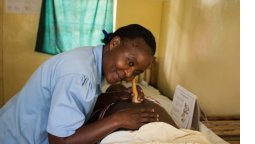 April 11th was the International Day for Maternal Health and Rights, which aims to encourage rights-based, respectful care of women during pregnancy and childbirth. The day was launched last year by the Centre for Health and Gender Equity, and co-sponsored by a consortium of maternal health organizations, including Women Deliver and the International Planned Parenthood Federation. These organizations are calling on governments, international institutions, and the global community to officially recognize the day and promote and support this issue. April 11th was the International Day for Maternal Health and Rights, which aims to encourage rights-based, respectful care of women during pregnancy and childbirth. The day was launched last year by the Centre for Health and Gender Equity, and co-sponsored by a consortium of maternal health organizations, including Women Deliver and the International Planned Parenthood Federation. These organizations are calling on governments, international institutions, and the global community to officially recognize the day and promote and support this issue.
Such an initiative is sadly necessary. Every woman should have the right to dignity, respect and skilled care during pregnancy and childbirth, but not every woman receives it. Evidence is growing about the disrespect and abuse women can face when accessing maternity care in countries at all levels of development. Such abuse includes physical abuse, humiliation and verbal abuse, unconsented clinical care, lack of confidential care, and abandonment or denial of care.
An international day can raise awareness about the need to provide respectful care for women and babies. Read more here.
|
|
World Immunization Week from April 24th to 30th
|
 World Immunization Week was April 24th to 30th. This week aims to promote the use of vaccines to protect people of all ages against disease. Immunization saves millions of lives and is widely recognized as one of the world’s most successful and cost-effective health interventions. Today, there are still 19.4 million unvaccinated and under-vaccinated children in the world. World Immunization Week was April 24th to 30th. This week aims to promote the use of vaccines to protect people of all ages against disease. Immunization saves millions of lives and is widely recognized as one of the world’s most successful and cost-effective health interventions. Today, there are still 19.4 million unvaccinated and under-vaccinated children in the world.
The theme of this year’s campaign is “vaccines work.” Immunization averts 2 to 3 million deaths annually; however, an additional 1.5 million deaths could be avoided if global vaccination coverage improves. Despite improvements in individual countries and a strong global rate of new vaccine introduction, all of the targets for disease elimination, including measles, rubella, and maternal and neonatal tetanus, are behind schedule.
Expanding access to immunization is crucial to achieving the Sustainable Development Goals. Routine immunization is a building block of strong primary health care and universal health coverage.
Read about more key facts of immunization coverage here.
|
|
World Malaria Day on April 25th
|
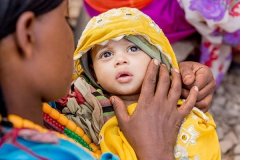 April 25th was World Malaria Day. According to the World Malaria Report 2016, between 2010 and 2015 the rate of new global malaria cases fell by 21% and the rates of death from malaria fell by 29%. Despite decreases in global malaria rates, malaria in pregnancy continues to contribute to dangerous health consequences for the mother and her unborn baby, such as severe anemia, low birth weight, and even death. These devastating impacts can be prevented with intermittent preventative treatment in pregnancy and sleeping under an insecticide treated bed net. April 25th was World Malaria Day. According to the World Malaria Report 2016, between 2010 and 2015 the rate of new global malaria cases fell by 21% and the rates of death from malaria fell by 29%. Despite decreases in global malaria rates, malaria in pregnancy continues to contribute to dangerous health consequences for the mother and her unborn baby, such as severe anemia, low birth weight, and even death. These devastating impacts can be prevented with intermittent preventative treatment in pregnancy and sleeping under an insecticide treated bed net.
On April 24th, the WHO Regional Office for Africa announced that Ghana, Kenya and Malawi will take part in a WHO-coordinated pilot implementation program that will make the world’s first malaria vaccine available in selected areas. The injectable vaccine was developed to protect young children from the most deadly form of malaria caused by Plasmodium falciparum, and will be assessed as a complementary malaria control tool that could be added to the core package of WHO-recommended measures for malaria prevention.
Read more here.
|
|
Message from the Editor on International Midwives Day
|
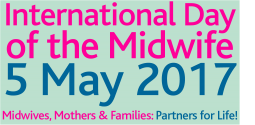 International Midwives Day was celebrated on May 5th under the theme “Midwives, Mothers and Families: Partners for Life!” This theme recognizes the working relationships midwives have with families to promote safe and fulfilling births. Across social media, people celebrated the work of midwives with the phrase “I believe in partnership” and the hashtag #IDM2017. International Midwives Day was celebrated on May 5th under the theme “Midwives, Mothers and Families: Partners for Life!” This theme recognizes the working relationships midwives have with families to promote safe and fulfilling births. Across social media, people celebrated the work of midwives with the phrase “I believe in partnership” and the hashtag #IDM2017.
I wish to recognize the valuable work of midwives around the world. Their support, respect and sensitivity for birthing mums during their most beautiful achievement is unbounded! We are the main caregivers for women and their newborns during pregnancy, labour, childbirth and in the post-delivery period. We are the most important person for preventing maternal and neonatal deaths, and still births.
I would like to invite all midwives and healthcare professionals to share your stories of maternal and newborn health in the next issue. If you have stories to share, please send them to mesidesta@gmail.com.
Thank you all for your contributions and working tirelessly to save the lives of mothers and newborns!
Meseret Haileyesus, Editor
|
|
|